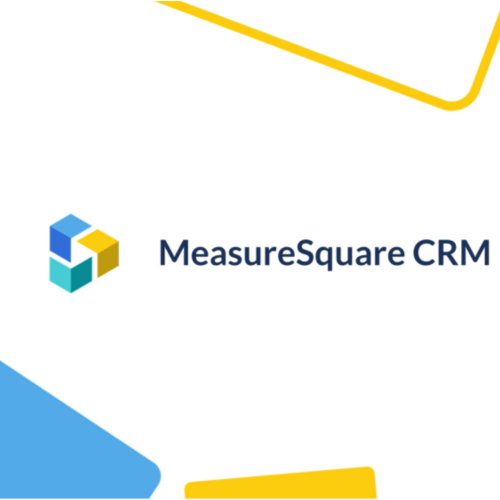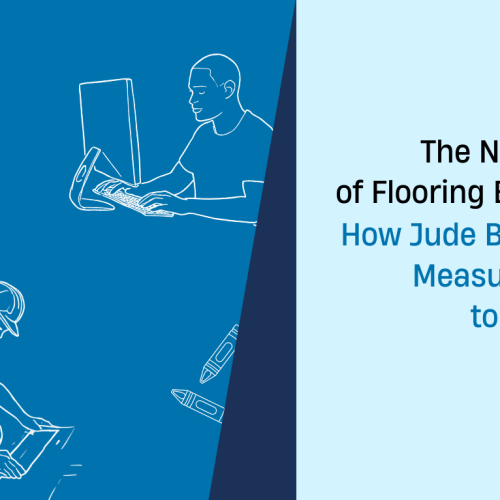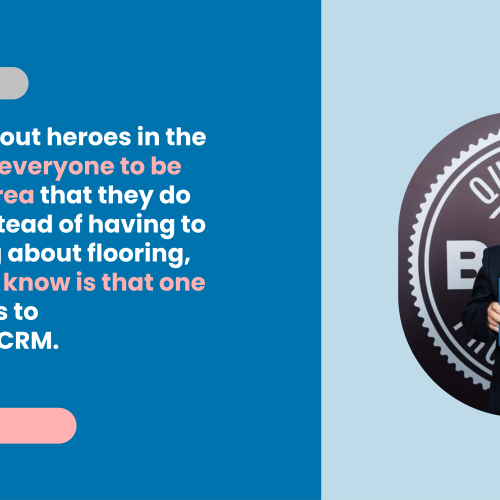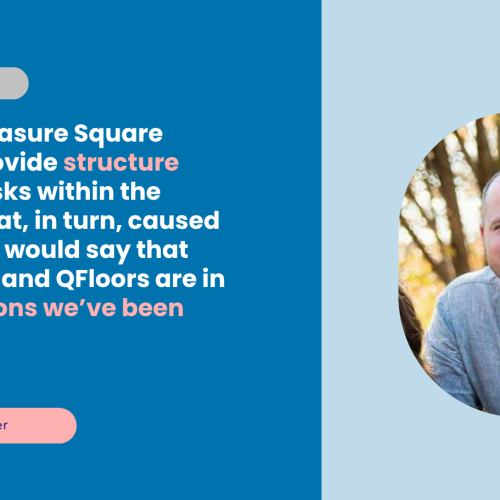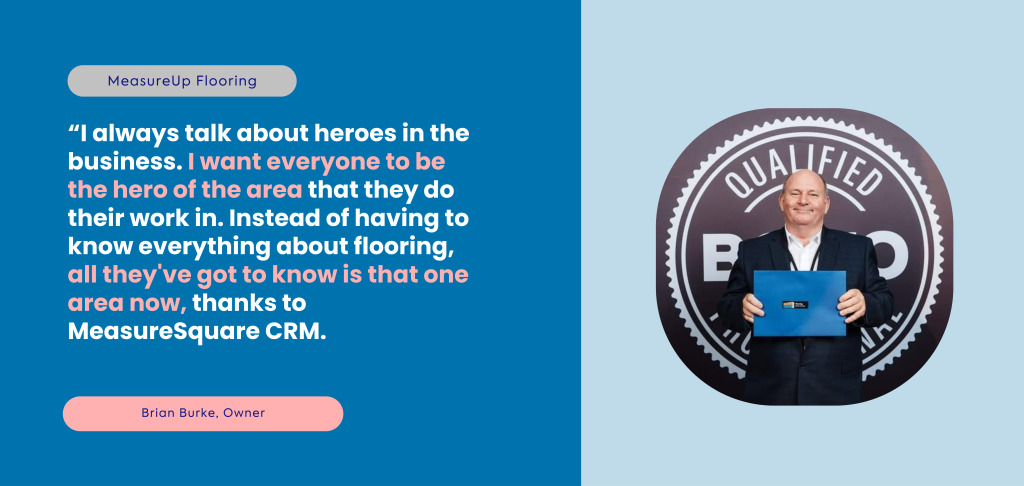
Training the Next Generation: How Brian Burke Replaced Skill Gaps with Smarter Systems
- 14 Jul, 2025
- CRM, Customer Stories

Before cloud-based apps and real-time syncs, Brian Burke ran his flooring business out of a van.
Armed with a laptop, mobile printer, internet connection, and a folding table and chair, he transformed his vehicle into a makeshift command center. He’d visit a jobsite, take measurements, retreat to his van to complete the plan, then head straight to the next appointment, often completing 10 to 12 measures a day. Meanwhile, others on his team were lucky to finish two. They had to return to the office, re-enter data from paper notes, and only then could they begin quoting.
This hustle-first, systems-later approach worked for a while. But as the business grew, so did the need for consistency, efficiency, and scalable processes, especially when bringing on new sales reps.
Today, Burke runs a streamlined, tech-driven operation powered by MeasureSquare Mobile and MeasureSquare CRM, two tools that have transformed the way his team estimates, sells, and closes jobs.
“The most expensive part of my business is hiring and training salespeople who can estimate and quote accurately on the spot,” Burke explains. “Measure Square gives us a system that works, even for newer team members.”
Let’s walk through how Burke’s team trains and empowers new reps using MeasureSquare Mobile and MeasureSquare CRM, from lead capture to job closeout.
Lead Entry and Appointment Scheduling with MeasureSquare CRM
The sales process begins the moment a customer expresses interest, whether it’s a phone call, a showroom visit, or an online form submission. At this stage, Brian’s team logs every new lead into MeasureSquare CRM, entering their contact details, address, and any notes about product preferences or showroom selections.
From there, the system automatically syncs the information to MeasureSquare Mobile, equipping the assigned sales rep with everything they need before they even walk into the home. This pre-appointment prep means reps aren’t starting cold. They’re walking in informed and ready to measure, quote, and sell.
Burke’s team has also adopted a “zone of ownership” mindset when it comes to team structure and MeasureSquare CRM usage. Every role is specialized, and every employee is empowered to become a subject matter expert in their part of the workflow.
“You load your job up on MeasureSquare CRM, your diagram. The measurer picks up their diagram, measures the room, syncs it back. That’s the job done,” explains Burke. “I always talk about heroes in the business. I want everyone to be the hero of the area that they do their work in.”
This mindset shift, from trying to hire all-in-one experts to building strong, focused workflows, has changed how his business operates. Instead of relying on experienced generalists (which are harder to find), Burke trains new hires to master one specific part of the process: job scheduling, quoting, measuring, or customer engagement.
“We’ve got one person doing job scheduling for three locations, Auckland, Whangarei, and Kaitaia, and it works,” he says. “Let each person become the best at their part.”
In-Home Measurement and Product Assignment
During the appointment, sales reps use MeasureSquare Mobile to measure each room and assign specific products (i.e., carpet, pad, vinyl, tile, etc.) to each area. They can visualize the job and prep it for quoting in real time, all from their tablet.
For new hires, this is a game-changer. They don’t have to guess or remember steps. The app guides them through every room, every measurement, and every product entry. It creates consistency, improves accuracy, and dramatically reduces the training curve.
Keeping Everything in Sync with MeasureSquare CRM
Once measurements are complete, the rep taps a button in MeasureSquare Mobile to send all data back to MeasureSquare CRM. This includes floor plans, product selections, and all associated quantities.
Everything lives in one system; no double entry, no email attachments, no searching for paper notes.
“Before MeasureSquare CRM, we had to re-key product data into StockUnify and other tools. It was a huge drain,” Burke explains. “Now, everything is centralized in MeasureSquare CRM. We’ve eliminated hours of admin work.”
That centralization allows reps, project managers, store staff, and installers to access exactly what they need and when they need it—all from the same interface.
Automate Lead Entry into MeasureSquare CRM with Zapier
For many flooring retailers, the problem starts before the rep even gets involved: missed leads. When prospects fill out a contact form on your website, it often triggers an email. And if no one enters that lead into MeasureSquare CRM right away, it can easily be lost or delayed.
To solve this, Brian Burke’s team uses Zapier to automate lead entry into MeasureSquare CRM. Here’s how it works:
When a customer fills out a form on the company website, an email is triggered. Zapier monitors the inbox, detects the lead email, extracts the relevant information, and automatically creates a new deal in MeasureSquare CRM, populating customer name, contact info, project type, and more.
This automation means no more missed leads sitting in email. Reps can follow up right away, and the lead is properly tracked in MeasureSquare CRM from day one.
Automated lead entry also improves data consistency, saves time for the sales team, and shortens the time between inquiry and appointment.
“We use Zapier to trigger a full workflow,” says Burke. “Once a lead is entered in MeasureSquare CRM, it pushes to Basecamp and ClockShark for team comms and time tracking. It’s a system built for speed.”
Quote Creation and Proposal Generation
Back in the field, once the project data is synced, reps use MeasureSquare CRM to generate a detailed bid proposal. No more calling the office. No more starting from scratch. The proposal includes the room diagrams, product selections, pricing, deposit amounts, and terms.
Burke’s team even adds QR codes to their proposals so that inventory labels and barcoded product tickets can be printed on demand, which saves the warehouse team hours of re-keying each order.
“We’ve got mobile printers on-site now. If we need ten bags of adhesive, the storeman scans the QR code, and prints ten barcoded tickets, instantly.”
Inventory, Installers, and Execution
Inventory was once one of Burke’s biggest headaches. His team used to rely on multiple apps and had to manually export purchase orders to other systems. Now, MeasureSquare CRM’s inventory module lets them manage stock, track usage, and simplify reorders, all within the platform.
Work orders are generated from MeasureSquare CRM with layouts customized for mobile. Installers receive everything they need on their phones, including site address, product specs, job notes, and contact numbers, without needing to swing by the store.
“We don’t want our installers coming in,” Burke says. “We prep everything the day before and deliver to the site. MeasureSquare CRM makes that work.”
Built for Scaling and Simplifying
As Brian Burke’s operation grew to include over 25 installers, multiple locations, and layers of communication, the complexity increased. But MeasureSquare CRM has kept everything organized, scalable, and centered on the customer.
From tracking project profit margins and SOVs, to creating simpler workflows for installers and store staff, MeasureSquare CRM acts as the central nervous system for the entire business.
“We use everything in MeasureSquare CRM: bids, work orders, scheduling, inventory,” says Burke. “It’s allowed us to grow without needing to hire more admin staff.”
Final Thoughts
MeasureSquare Mobile and MeasureSquare CRM are more than tools; they’re a system that helps flooring businesses train new sales reps, simplify workflows, and close more jobs with fewer headaches. As Brian Burke’s story shows, smart tech and smart processes can transform your business from reactive to proactive, and from scattered to streamlined.
Want to learn how MeasureSquare CRM can streamline your operations and drive growth like it did for Brian? Book a demo.
Not ready to take the leap? Test-drive MeasureSquare CRM with our free 14-day trial: Begin your trial.


